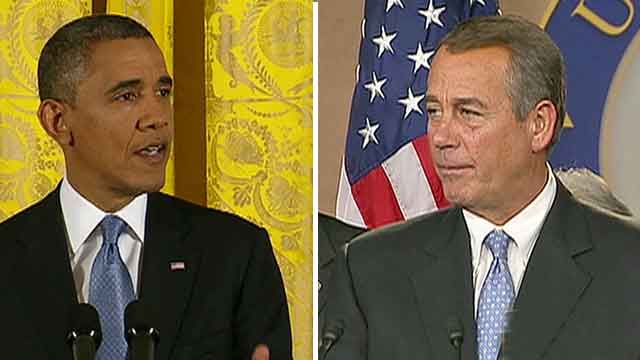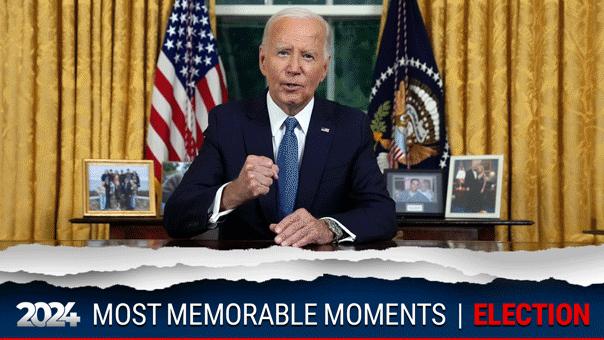No longer in search of a "grand bargain," lawmakers and President Obama seem to have rapidly scaled down their expectations for a bill that averts -- or at least shrinks -- the looming fiscal crisis. They're now talking about doing the bare minimum.
But with less than a week remaining to pull a bill together, they still face some very tough choices. Lawmakers must determine what the bare minimum entails and, perhaps more importantly, how they will muster enough votes to pass it.
None of this is a sure thing, and the down-to-the-wire negotiations have only upped the chances of a sweeping tax hike hitting in the new year. Senior House Republicans are trying to put the onus on the Senate to act, yet Senate Democratic Leader Harry Reid does not have a bill.
A Gallup poll released Wednesday showed Americans' optimism is fading that lawmakers will reach a deal before Jan. 1.
On Wednesday night, Obama flew out of Hawaii, where he spent Christmas with his family. He is expected to arrive in Washington early Thursday. House Speaker John Boehner is also expected to return to Washington soon -- it's not clear when -- as the Senate comes back into session Thursday. Reid is already in Washington.
Obama aides and lawmakers are now talking about a scaled-down package as the most likely vehicle for solving the problem, something that could at least prevent most of the scheduled tax hikes and maybe extend jobless aid. Then lawmakers could renew the debate early next year over the most contentious issues of entitlement cuts and tax reform.
But figuring out what to include in a scaled-down package could prove just as vexing as before. The first challenge is to determine who, if anyone, will see a tax hike next year.
Obama first demanded taxes rise for all households making more than $250,000. Then he offered a deal that raised the threshold to $400,000. Boehner, after previously opposing any tax rate hike, countered with a plan setting the income threshold at $1 million -- that plan died in the House. Any tax hike deal would likely fall somewhere between those two goalposts, though it's unclear where.
Obama has indicated he still prefers an increase for those making over $250,000.
And Boehner continues to resist tax hikes.
"The American people re-elected President Obama on Election Day. They also re-elected a Republican majority in the House," Boehner said last week. "In doing so, they gave us all a mandate. It was not a mandate to raise tax rates on families and small businesses. It was a mandate for us to work together to begin solving the massive debt that threatens our country's future."
Beyond that, there are a host of other provisions that may or may not be addressed. Lawmakers will have to determine whether to extend long-term unemployment benefits, which are expiring for 2 million people. Medicare payments to doctors are also set to shrink by 30 percent next year unless Congress acts. A 2-point payroll tax cut is set to expire. And a short-term fix to something known as the alternative minimum tax is also set to lapse, which could lead to a nearly $4,000 tax hike for millions of families.
On top of all those provisions are the $110 billion in automatic spending cuts -- half of which would hit the Pentagon -- scheduled to hit next month.
Drafters of any fiscal crisis bill would have to make difficult decisions on which of these provisions to avert, and which to allow.
After that would come the politics and logistics of a vote. Boehner, who according to sources lost 40 Republicans on his Plan B proposal last week, would likely need some Democrats to pass any package that raises tax rates. But any move to pass a bill with too few Republicans could spur an uprising among conservatives.
Reid, too, faces a balancing act -- Democrats do not have enough votes in the chamber to hit the 60 votes it takes to overcome a filibuster. Senate Republican Leader Mitch McConnell would either have to allow a simple-majority vote for something to pass, or Reid would need to peel off a few Republicans to reach 60 votes.
In the face of all these challenges, it is possible lawmakers will simply do nothing -- allowing the tax hikes and spending cuts to hit, and perhaps returning next year to try cleaning up the mess. Prolonged inaction, though, could lead to another recession, the Congressional Budget Office warns. Lawmakers could also pass a short-term bill extending current rates in hopes of reaching a bigger deal next month.
Since Friday, virtually nothing has happened on the fiscal crisis front. A spokesman Boehner said the president and the speaker did not talk over the weekend. Representatives for the Republican and Democratic Senate leaders both said Monday they had "nothing" to report.
One administration official suggested there was a bit more contact in recent days between White House staff and Senate Democratic leadership staff, indicating that new legislation, if proposed, could come from the Senate side.





